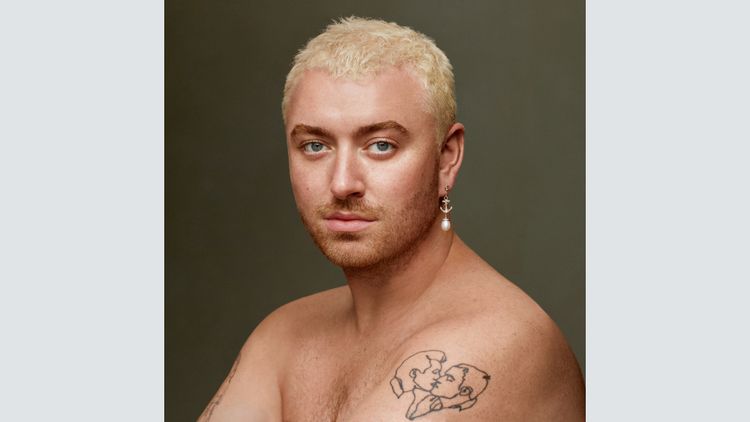Sam Smith's 'Gloria': Album Review

With an uncommonly powerful voice and a debut album that garnered four Grammys, Sam Smith easily could have stayed in the same lane for their entire career — beautifully sung songs about heartbreak and longing in a smooth, sometimes slick pop-R&B vein with a dazzling array of vocal pyrotechnics. But after three albums, so much heartache and moping began to feel like a third dinner with your recent-big-breakup friend.
Smith’s fourth album, “Gloria” is not that at all — it’s a wild, wide-ranging night out that’s tinged with adventure and some danger, but still gets you home safely. More than a new chapter for Smith, it’s a musical rebirth that completely redefines them as an artist — there are smooth and commercial songs along with ballads and slow jams and dancefloor anthems, and most of all, an adventurousness that was only hinted at before. It’s full of surprises.
But along with all that, Smith has become a much more assured singer, their vocals and phrasing taking on a nuance that evokes classic R&B singers from Gladys Knight and Anita Baker to Mary J. Blige, but more the mid-period work of George Michael, Sade and Prince. There’s plenty of the powerhouse soaring that fans crave, but it’s used strategically and sparingly, with the focus more on suiting the mood and the lyric than shattering glass. The heartache is still there, but with less insecurity and more I-will-survive, like the songs are coming from a person more comfortable in their own skin.
The album opens deceptively with “Love Me More,” a gospel-inflected self-care song that places its empowering but sometimes dark lyrics — “Every day I’m trying not to hate myself” — over a sincere, sing-song melody that seems more suited to a John Legend or Jon Batiste (or, honestly, a TV commercial). But from there the album shifts into gear with three R&B-tinged songs that swing between the low-key disco of “Lose You” to the sultry “Perfect,” a duet with Canadian-Colombian singer Jessie Reyez that sums up one of the album’s themes: “I’m not perfect, but I’m worth it/ I’m not perfect, but I’m working on it.”
The easy groove of those three songs comes to a lurching halt when “Unholy” — Smith’s swaggering smash duet with Kim Petras released last fall — throws open the door and thunders in. A throbbing pop-dance track about a family man’s adventures in unsafe sex, it has a skulking rhythm and raucous, roaring chorus that sounds like a cross between an Arabic melody and a sea chanty. It’s the most sexually loaded song to top the Billboard Hot 100 since Cardi B and Megan Thee Stallion’s “WAP,” but it’s one of the most musically innovative and unusual songs in years to do the same.
How do you follow that? With a gentle acoustic ballad called “How to Cry,” of course. The album’s sequence proceeds masterfully, ebbing and flowing in mood and sound, dropping down with the post-coital slow jam “Six Shots,” picking up again with the pinging electro single “Gimme,” and climaxing with an irresistible disco anthem that could well be Smith’s next No. 1 and the song of this summer, “I’m Not Here to Make Friends.” A collaboration with Reyez and DJ titan Calvin Harris, it’s embellished with a Chic groove, sparkling strings and a sassy title that will inspire countless don’t-f-with-me finger-pointing on dancefloors, but the real payoff comes in the response: “I’m not here to make friends/ I need a lover.” (And may we respectfully suggest that a remix featuring Dua Lipa would be stunning.)
Naturally, that energy peak is followed with something drastically different: the hymn-like, vocals-only title track, which was recorded with a full choir in the medieval-era church Smith attended as a child (and which they performed on “Saturday Night Live” last weekend with a surprise appearance from actor Sharon Stone). The song features just the choir for the first minute, until Smith’s voice comes soaring in, evoking images of angels on a church ceiling; although they’ve described it as “my queer anthem,” the lyrics are fairly elliptical and again are counterintuitive to the music — demons and monsters in the first verse, empowerment in the second. But the spiritual themes of a song called “Gloria” sung by a medieval-sounding church choir could not be more obvious.
It seems like the finale, but it’s not: The album closes with “We Love Who We Love,” a gentle, hand-on-the-shoulder duet with Ed Sheeran that leaves the listener, no doubt intentionally, with the words, “So let go/ You don’t know better than your heart knows/ We love who we love.”
For such a musically far-reaching album — with 11 fully realized songs in just over 33 minutes, no less — it’s surprising that Smith and longtime musical collaborator Jimmy Napes worked mostly with just two teams: the long-running multiplatinum Norwegian duo Stargate (Beyonce, Mariah Carey, Rihanna) and the quartet of Ilya, Cirkut, Blake Slatkin and Omer Fedi (Ariana Grande, Nicki Minaj, the Weeknd, Lil Nas X, Justin Bieber between them), although “We Love Who We Love” was helmed with longtime Sheeran collaborator Johnny Mac.
Their contributions can’t be understated, but there’s no question that this is Smith’s story. “It feels like emotional, sexual and spiritual liberation,” they said of the album when it was announced last fall. “Oddly, it feels like my first-ever record. And it feels like a coming of age.” With songs that are both sacred and profane, with R&B and pop and disco and chorales, “Gloria” is all of that and more.

















































